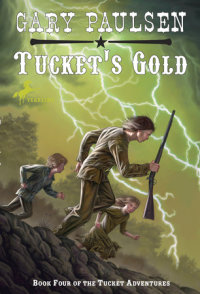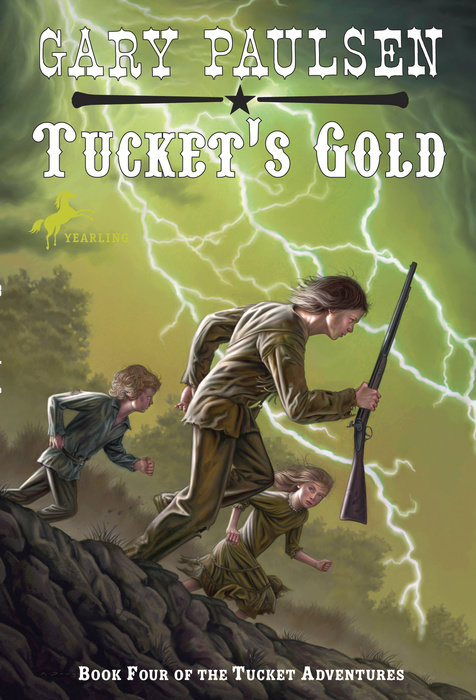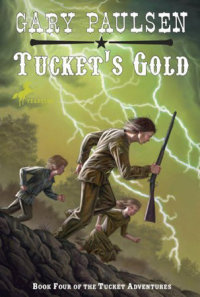Tucket's Gold
Tucket's Gold is a part of the The Francis Tucket Books collection.
Gary Paulsen's popular Western saga continues in the fourth novel about Francis Tucket.
Things look grim for Francis and his adopted family, Lottie and Billy. Without horses, water, or food, they're alone in a prairie wasteland, with the dreaded Comanchero outlaws in pursuit. Death can strike at any moment -- but so can good fortune. When they stumble upon an ancient treasure, it takes teamwork, courage, and wit to hold on to it. By sticking together, Francis and his family wind up rich beyond their wildest dreams, and ready to head west to find Francis's parents on the Oregon Trail.
An Excerpt fromTucket's Gold
If there was one thing Francis Tucket knew with certainty it was that death, brutal death, was close to taking them.
Dawn was coming and here he was, a fifteen-year-old boy in charge of two children, walking across a sunbeaten, airless plain that seemed to be endless. Francis, Lottie and Billy had no food or water or any immediate hope of getting any, and at any moment a dozen or two of the dirt-meanest men Francis had ever seen in a world full of mean men could come riding up on them and . . .
He didn't finish the thought. There was no need. Besides, in surviving Indian fights, blizzards, gun battles and thieves, he had learned the primary rule about danger. It would come if it would come. You could try to be ready for it, you could plan on it, you could even expect it, but it would come when it wanted to come.
Lottie and Billy understood this rule too. He had found them sitting in a wagon on the prairie all alone. Their father had died of cholera and their wagon train had abandoned the family, afraid of disease. Lottie had been nine then, Billy six. Francis hadn't thought he and the children would stay together long--after all, he had to keep searching for his own family. He'd been separated from them over a year before, when Pawnees had kidnapped him from the wagon train on the Oregon Trail. But Francis and Lottie and Billy--well, they were used to each other. They stuck together. Unlike Francis and Jason Grimes, the one-armed mountain man.
Jason Grimes had rescued Francis from the Pawnees and taught him how to survive in the West on his own. Then they'd parted ways.
Until last night. Last night when Grimes had helped them to escape from the Comancheros. The Comancheros were an outlaw band, ruthless, terrifying, inhumanly tough. To escape, Grimes had had to take the packhorses Francis and Lottie and Billy had been riding and lead them off empty, hoping the Comancheros would follow his tracks westward while the three children headed north on foot in the dark of night.
It was a decent plan--it was their only plan--and it seemed to be working. As Francis and the two children had moved north in the dark, they had seen the Comancheros ride past them after Mr. Grimes, tracking the horses. The Comancheros had missed the footprints of the children, partly because it was hard to see them and partly because Francis made Lottie and Billy walk in each other's footprints. He came last, brushing out the trail with a piece of mesquite behind him.
But luck was the major factor in the plan. If the Comancheros caught Grimes or even got within sight of him they'd know that Francis and the children weren't with him. They'd turn and come back for the children. Children meant real money because they could be sold or traded into slavery.
Francis knew that brushing out the tracks would only work in the pitch dark of night. In daylight the brush marks themselves would be easy to follow.
"I'm tired." Billy stopped suddenly. "I think we've gone far enough."
Francis frowned. When Francis had first met Billy, the boy wouldn't say a word. And now he'd gone from never talking at all to complaining.
"If they catch us"--Lottie slapped Billy's head so hard Francis thought he heard the boy's brains rattle--"they'll skin you. They'll make a tobacco pouch out of you and let the coyotes have the rest. Now keep walking. If we don't keep moving they'll be on us like dogs, won't they, Francis? On us just like dogs . . ."
Lottie loved to talk, would talk all the time if she had the chance, seemed to have been talking since Francis had found her in that wagon. Lottie would explain every little detail of every little part of every little thing she was talking about so that not a single aspect of it was missed, and she sometimes drove Francis over the edge. Now, as Billy started moving again, Francis picked up the pace, pushed them as hard as they could stand it and then harder, and Lottie didn't have breath left to speak.
Dawn brought the sun and the sun brought heat. Francis and the children were bareheaded and the sun quickly went to work on them. Billy wanted to complain, especially as the morning progressed and there was no water and the sun rose higher and became hotter, but Francis drove them until Billy began to weave. Then Francis handed Lottie his rifle and, pushing her in front of him, he picked Billy up and carried him piggyback, mile after mile, then yard after yard, and finally, step after step.
Lottie saw it first.
"There," she said. "See the spot?"
Francis was near dead with exhaustion. He had hardly slept at all for the two nights before and had been used roughly by the Comancheros in the bargain. He was close to the breaking point as he said, "What spot?"
"There. No, more to the right. On the horizon. It's trees. I'm sure of it. A stand of trees."
They had seen many mirages--images of trees and water that were not there. But Francis looked where she was pointing and saw it instantly. He stopped and set Billy down. The boy was asleep, and he collapsed in a heap, still sleeping. "You're right! Trees. And trees mean water."


